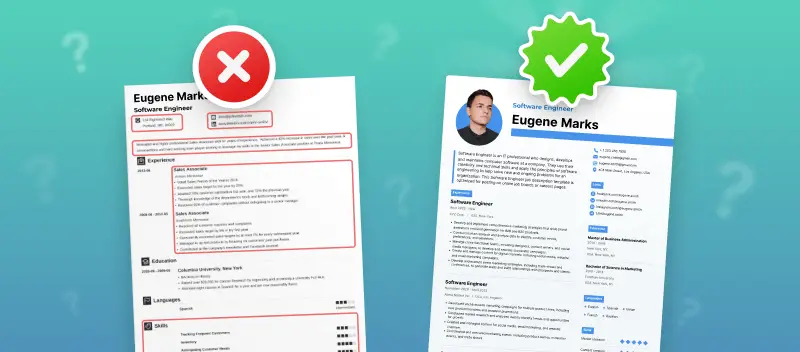Your grades can be a significant element of your academic history, but is it necessary to add GPA to resumes?
For recent graduates or students, it might seem like a key component, but for experienced professionals, other aspects might take precedence.
This article explores when and how to put your GPA on a resume and when it might be better to leave it off.
Resume examples with GPA:
What is a GPA and why it matters?
GPA stands for Grade Point Average. It's a numerical representation of a student's academic performance, typically on a scale from 0.0 to 4.0, though some institutions may use different systems.
The GPA is calculated by averaging the grades a student earns in their courses over a specific period, such as a semester or their entire academic career.
For example:
- An A might be worth 4.0 points,
- A B might be 3.0 points,
- A C 2.0 points, and so on.
If a student earns an A (4.0) in one course and a B (3.0) in another, their GPA for those courses would be 3.5.
- Why should i put my GPA on my resume?
Employers often view GPA as a measure of academic abilities and work ethic. A higher number suggests that the candidate is disciplined, able to manage their time well, and capable of mastering the material in their field.
Some companies also use GPA as a filter to narrow down the pool of applicants. For example, a company might set a minimum requirement of 3.0 or 3.5 for candidates to be considered for a position.
Create your professional Resume in 10 minutes for FREE
Build My Resume
Should you put your GPA on your resume?
Including your GPA on your resume can be a strategic decision, depending on your situation. Below are some cases when it might be beneficial.
High GPA
If you have a high GPA (typically 3.5 and above), it can demonstrate strong academic performance and make you a more competitive candidate. Including it is especially beneficial if you're applying for jobs such as in finance, consulting, or law.
Recent graduate
If you’ve recently graduated and don’t have much work experience, your GPA might be one of the few quantifiable achievements you have to show your potential. In this case, mentioning it can help bolster your resume and provide employers with a sense of your capabilities.
Required by the employer
Some job postings explicitly ask for a resume with GPA as part of the application process. In these cases, it’s essential to add your GPA, even if it’s not particularly high. Avoiding it could be seen as ignoring the instructions, which might hurt your chances.
Internships or entry-level positions
For internships and entry-level jobs, especially in competitive fields, your GPA can be important. Employers in these situations may rely more on academic performance to assess candidates because professional experience is often limited.
Academic or research-oriented roles
If you’re applying for roles in academia, research, or any position that highly values educational background (like certain government positions or advanced study programs), your GPA is a critical factor and should be included.
When to leave your GPA off your resume?
Low GPA
If your GPA is below 3.0, it might be better not to add it unless the employer specifically asks for it. In such cases, you might focus more on relevant experience, skills, or coursework.
Significant work experience
If you have several years of professional experience, your GPA may become less relevant, and employers will be more interested in your job performance and achievements.
How to list GPA on a resume?
The education section is where to put a GPA on your resume. Simply list it on the same line as your degree or just below it.
If you want to provide more context, you can list both your overall and major GPA.
Example of GPA on resume:
Bachelor of Business Administration, Duke University
Overall GPA: 3.5/4.0 | Major GPA: 3.7/4.0
If you graduated with honors or degree, you can include it alongside your GPA.
Always include the scale if it’s not the standard 4.0. This helps avoid confusion.
Create your professional Resume in 10 minutes for FREE
Build My Resume
GPA equivalents in various countries
| Country | System | Grade Range | Approximate US GPA Equivalent (4.0 scale) |
|---|---|---|---|
| United Kingdom | Degree Classifications | First Class (70–100%) | 3.7 – 4.0 |
| Upper Second (60–69%) | 3.3 – 3.7 | ||
| Lower Second (50–59%) | 2.7 – 3.3 | ||
| Third Class (40–49%) | 2.0 – 2.7 | ||
| Fail (<40%) | Below 2.0 | ||
| Canada | Percentage / Letter Grades | 85–100% (A) | 4.0 |
| 80–84% (A-) | 3.7 | ||
| 75–79% (B+) | 3.3 | ||
| 70–74% (B) | 3.0 | ||
| 60–69% (C range) | 2.0 – 2.7 | ||
| Australia | Percentage / Honors Classifications | High Distinction (85–100%) | 4.0 |
| Distinction (75–84%) | 3.0 – 3.7 | ||
| Credit (65–74%) | 2.0 – 3.0 | ||
| Pass (50–64%) | 1.0 – 2.0 | ||
| Fail (<50%) | 0 | ||
| Germany | Numeric Grades (1.0 best - 5.0 fail) | 1.0 – 1.5 | 4.0 |
| 1.6 – 2.5 | 3.0 | ||
| 2.6 – 3.5 | 2.0 | ||
| 3.6 – 4.0 | 1.0 | ||
| 4.1+ | 0 | ||
| India | Percentage | 70%+ (First Class) | 3.5 – 4.0 |
| 60–69% (Second Class) | 2.5 – 3.4 | ||
| 50–59% (Pass Class) | 2.0 – 2.4 | ||
| Below 50% | 0 | ||
| France | Grades out of 20 | 16–20 | 4.0 |
| 14–15.9 | 3.0 | ||
| 12–13.9 | 2.0 | ||
| 10–11.9 | 1.0 | ||
| Below 10 | 0 |
FAQ
- Can I round up my GPA?
- You can round your GPA to the nearest hundredth, but do so carefully (e.g., 3.48 to 3.5). Never round up by more than this.
- What if my GPA improved significantly during my time in school?
- You can highlight your improved GPA, such as "Final Two Years GPA: 3.9/4.0" to emphasize your academic growth.
- Should I list my GPA if I'm a graduate student?
- Yes, especially if it's strong and relevant to the field you're pursuing. Graduate-level GPAs often hold more weight in specialized fields.
- How do I explain a low GPA in an interview?
- Be honest and focus on how you’ve grown since then. Highlight other strengths, such as work experience, skills, or extracurricular achievements.
- Do employers verify GPA?
- Yes, they can check your GPA through transcripts. Be truthful to avoid any potential issues.
- What if my GPA is good but my school has a tough grading system?
- You can provide context in your resume or cover letter, or mention the average GPA for your program if it’s significantly lower than yours.
Conclusion
Whether to put a GPA on your resume or not depends on several factors, including your level of experience, the industry you're entering, and the strength of your grades.
While it can help highlight your academic achievements, especially for recent graduates, it is not always necessary or beneficial.
Consider the overall impact it will have on your resume and whether it aligns with your career goals before deciding to include it.












